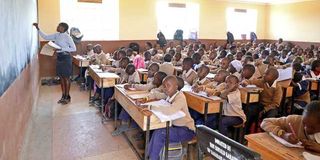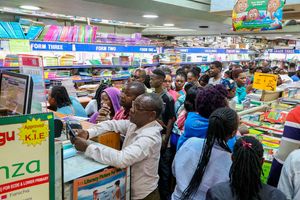
Ms Meldas Diana, a teacher at Mwiki Primary School in Nairobi, takes her Grade Five pupils through a maths lesson last month.
Thousands of parents have transferred their children from private schools to public ones to navigate the hard economic times, the Nation can reveal. Spot checks on public schools show unusually huge number of students who transferred in January from private schools despite the challenges that the public institutions face like poor and inadequate infrastructure and understaffing.
Managements of private schools who spoke to the Nation also confessed that parents owe the institutions millions of shillings and that many of them are on payment plans. Although they denied the flight from their schools, the data from public schools tells a different story.
In just two months, Bungoma DEB Primary School has received over 300 new learners, transferring from other schools. About 200 of these have come from private institutions, popularly referred to as academies.
Mr Tobias Khisa, the school’s headteacher, revealed that the surge in enrolment has placed a considerable burden on the school’s infrastructure and resources. The school, with an initial enrolment of 4,391 students, is now experiencing overcrowded classrooms and teachers being stretched thin to accommodate the sudden increase.
“We currently have 103 teachers from the TSC, and the ratio of students to teachers is beyond the recommended limit, leading to significant strain. Specifically, in primary classes, the ratio is 1:63, and in junior classes, it worsens to 1:70. This situation is exacerbated by the recent surge of students transferring from private schools,” said Mr Khisa.
The chair of the Kenya Private Schools Association, Mr Charles Ochome, told Nation that schools have different ways of dealing with parents who are unable to pay on time.
“That’s expected. The economy isn’t very good, but we don’t pressure the parents to pay the whole amount at once. It depends on how school managements relate with their parents,” Mr Ochome said.
Meanwhile, many families have been forced to re-evaluate their financial priorities, and the cost of education has emerged as a significant factor, with many parents who once comfortably afforded private school tuition now finding themselves struggling due to job uncertainties, salary cuts, rising inflation, and other financial pressures.
But according to Mr Khisa, switching schools has an effect on the learners: “The transition is accompanied by culture shock as learners encounter differences in classrooms, infrastructure, and homework. Some students express dissatisfaction, particularly in the initial stages, possibly due to discomfort with the environment.”
Education Cabinet Secretary Ezekiel Machogu told Nation that his ministry is aware of the transfers and the effect on infrastructure and learning quality in public schools.
Mr Machogu said parents opt for private education for their children out of a perception that it is superior to public education.
“They take their children there in the hope that they’ll score better marks and go to national schools [which are public]. We don’t have enough capacity in public schools but we’re trying to remedy the situation,” he said.
He explained that the national government has allocated Sh1 billion to be shared equally among all constituencies for school infrastructure.
“The situation in Nairobi, for example, is a crisis that requires affirmative action. We have over 800 private schools and only 200 public institutions. We’ve also invited the county government to come in to increase the capacity for Nairobi,” Mr Machogu said.
“The private sector has been our major partner where we don’t have capacity. If it wasn’t for the work they do, the situation would’ve gone out of control. We support them as long as they meet our requirements,” the CS said.
The national chair of the Kenya Primary Schools Heads Association, Johnson Nzioka told Nation that the growing trend of students transferring from private to public schools, particularly in urban centres is particularly noticeable from Grade 6, with a significant impact on public schools.
Mr Nzioka acknowledged the pressure on public schools for admission to junior secondary school, highlighting the strain on infrastructure as a consequence of the increased student population.
"It is true that there is an influx from private schools to our public schools, mostly in urban centres where it is generally from Grade six. Parents are rushing to our public schools for admission to junior secondary school. There has been that pressure which has been noted in our schools,” said Mr Nzioka.
He further said that the move from private to public schools is influenced by some smaller private schools that lack the capacity to establish junior secondary sections, prompting parents to seek admission in public schools.
“Economic considerations are undeniably influencing the current trend of students transitioning from private to public schools. We have observed that some parents are facing difficulties affording fees in private schools, leading them to opt for public schools where government funding, in the form of capitation, is readily available. This financial aspect is a significant factor contributing to the increased demand on our public schools.”
Put a strain
Mr Nzioka said the shift from private to public schools is putting a strain on infrastructure, exceeding schools’ capacity due to pre-existing overpopulation.
“We provide data to the Teachers Service Commission (TSC) every month. This data is aimed at developing a method to balance the admission process, prioritising schools that are accommodating extra students. Our goal is to address the challenges arising from this transition and ensure a fair and efficient admission system,” he said on what they are doing to counter this.
A school in Nairobi has reported a five per cent surge in students shifting from private to public institutions. The increase in transfers from private to public schools is notable, with many parents attributing their decision to challenging economic conditions and shifts in their daily lives.
“We are experiencing a higher number of these transfers. Many parents are citing the tough economic times, adding that life is changing for them. Since the beginning of the year, we have observed a private-to-public school transfer rate of approximately five per cent, a substantial figure considering the existing limitations in resources and infrastructure,” said the school’s headteacher, who requested anonymity.








